A Consortium is a network of individual research groups or centres with a common interest in a specific research area of hepatology with an organisational structure that facilitates the development of common research projects and fosters the acquisition of financial resources to support the activity of the consortium.

Aim
- To establish multidisciplinary European-based research networks to address important issues on the pathophysiology, diagnosis and treatment in specific fields of Hepatology.
- To facilitate interaction and integration between basic and clinical research activity.
- To identify new relevant topics in a field, to establish synergies between groups within and outside the network and areas of cooperation with biotech and pharmaceutical European industry.
- To design a multi-annual coordinated research program of the network based on these features.
- To select, through peer review, research proposals from the Consortium Centres, and facilitate the interaction between potentially interested centers to engage in these projects.
- Based on the above, to make calls on specific research projects, to which the Centres participating to the Consortium can adhere on a voluntary basis.
- To foster fundraising from external sources (e.g., public agencies, foundations, and industry) to support approved research projects.
- To stimulate the formation of new research groups in that field and to provide opportunities for young investigators to enter in the field.
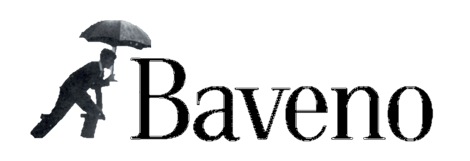
The EASL-Baveno Consortium was set up by with the Baveno Cooperation as an international multidisciplinary research network of groups or centres. Its primary mission is to improve the outcome of patients with portal hypertension through cooperative research. The Consortium seeks to address important issues on the pathophysiology, diagnosis, and treatment of portal hypertension. Please add a few sentences here about specific research projects or activities that are planned.
The Baveno Cooperation is built on foundations already laid by the Baveno Consensus Workshop. For nearly three decades, Baveno meetings have been convening experts, leaders, and members of the scientific community interested in portal hypertension and its manifestations. The Consortium strives to draw upon the synergies that this community offers, by involving new parties who are keen to improve this field of hepatology worldwide.
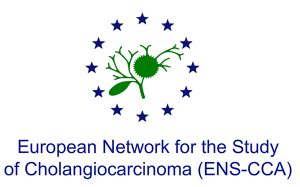 The European Network for the Study of Cholangiocarcinoma (ENS-CCA) is an open, international network of scientists focused on the multidisciplinary study of CCA. This pan-European consortium was created in 2015 with the main aim of promoting collaborative research projects at the basic, translational and clinical levels.
The European Network for the Study of Cholangiocarcinoma (ENS-CCA) is an open, international network of scientists focused on the multidisciplinary study of CCA. This pan-European consortium was created in 2015 with the main aim of promoting collaborative research projects at the basic, translational and clinical levels.
The ENS-CCA is coordinating a European Registry of patients with CCA (competitively funded by EASL in 2016 and in 2019) with clinical, biochemical, histological information using the on-line platform REDCap. This registry is the basis of multiple ongoing collaborative projects, which include the use of biological samples of patients from participating Institutions.
The ENS-CCA consortium has been awarded with a COST Action (European Cooperation in Science and Technology; H2020) called “EURO-CHOLANGIO-NET” (2019-2023) that will support the creation of different working groups (on basic science, histological and morphological characterisation, molecular profiling, experimental therapeutics, biomarkers/diagnosis, and epidemiology/clinical trials), collaborative projects, dissemination programmes, congresses/schools/workshops, and exchange of students between European institutions, among others.
 In the origin of the EF-CLIF lies the European Association for the Study of the Liver – ChronicLiver Failure (EASL-CLIF) Consortium. An independent entity, the Consortium, with almost a hundred hospitals in 25 countries, is an important instrument for carrying out observational and therapeutic studies on large series of patients.
In the origin of the EF-CLIF lies the European Association for the Study of the Liver – ChronicLiver Failure (EASL-CLIF) Consortium. An independent entity, the Consortium, with almost a hundred hospitals in 25 countries, is an important instrument for carrying out observational and therapeutic studies on large series of patients.
In July 2008 the CLIF Consortium was formally presented to the EASL Governing Board. In January 2009, 19 EASL members signed a formal proposal asking for EASL official support to the CLIF-Consortium. Finally, in February 2009, the EASL Governing Board decided to endorse the CLIF Consortium under the official name of “EASL-CLIF Consortium”.
The EASL-CLIF Consortium had an early development inside the EASL and since its foundation (2009) has received, as unrestricted grants from Grifols, more than 5 million Euros. This represents the first “scientific joint venture” between Industry and Academia regarding Hepatology. Its most significant achievement has been in identifying, characterizing, establishing diagnostic criteria, designing new prognostic scoring, and understanding the mechanisms of a new syndrome (Acute-on-Chronic Liver Failure), which constitutes the principal cause of death from cirrhosis. Before the establishment of the EF CLIF, the Fundació Clínic for Biomedical Research has gave legal and institutional support to the Consortium.
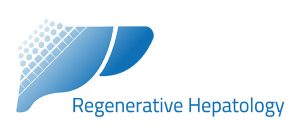 To date, the only definitive treatment available for acute or chronic end-stage liver disease is liver transplantation. However, a lack of donor livers subsists, mainly due to expanding indications and the increase of patients on waiting lists. Over the past decade, major advancements have been made in the research field broadly termed “regenerative Hepatology”. These include breakthroughs in stem cell research and in the development of advanced biotechnologies/biomaterials.
To date, the only definitive treatment available for acute or chronic end-stage liver disease is liver transplantation. However, a lack of donor livers subsists, mainly due to expanding indications and the increase of patients on waiting lists. Over the past decade, major advancements have been made in the research field broadly termed “regenerative Hepatology”. These include breakthroughs in stem cell research and in the development of advanced biotechnologies/biomaterials.
Times have become mature to coordinate the integration of multiple distinct technologies in one single advanced therapy development chain leading to the optimization of liver tissue engineering and associated biotechnologies. This with the aim to implement and even replace liver transplantation and thereby serve a large patient group with an urgent medical need.
The EASL Consortium for Regenerative Hepatology is aimed at the delivery of bioengineered tissues and associated biotechnologies for regenerative Hepatology. The Consortium is a multidisciplinary European-based organization including individual research groups or established centers willing to join efforts to achieve common goals and fosters the acquisition of financial resources to support the activity of the Consortium.
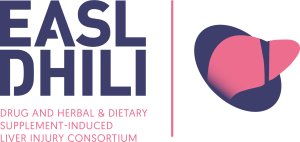 Drug-induced liver injury (DILI) is an uncommon and potentially severe adverse drug reaction following an exposure to medications, herbal products or dietary supplements. Idiosyncratic DILI is attributable to medicinal products taken in a therapeutic dose and has been described in association with over 650 drugs used in clinical practice.
Drug-induced liver injury (DILI) is an uncommon and potentially severe adverse drug reaction following an exposure to medications, herbal products or dietary supplements. Idiosyncratic DILI is attributable to medicinal products taken in a therapeutic dose and has been described in association with over 650 drugs used in clinical practice.
The EASL DHILI Consortium is a multidisciplinary network of clinicians, scientists, patients, industry partners, and regulators, all with an interest in the study of Drug and Herbal & Dietary Supplement-induced Liver Injury.
Their objectives are:
- To develop a shared understanding of the key issues related to adverse reactions related to drugs, herbal and dietary supplements in all settings relevant to the members of the consortium and society.
- To promote, participate and lead research in topics related to drugs, herbal and dietary supplement-induced liver injury.
- To generate, synthesise and disseminate evidence that prevents drug-induced liver injury (DILI) and improves care of patients with DILI.
- To facilitate national and international research and educational activities related to DILI.
- To set up an international network of centres to harmonise nationally and internationally funded research activities towards a common goal of providing bench, bedside and population perspectives in DILI.
This consortium was born from an awarded COST Action (European Cooperation in Science and Technology, funded by the European Union) called “Prospective European DILI Network CA-17112”) to set up a European-wide interdisciplinary co-operative network of stakeholders in the DILI field (including scientists, clinicians, regulatory authorities, Small and Medium Enterprises (SMEs) and industry partners).
More information: https://easldhiliconsortium.eu/
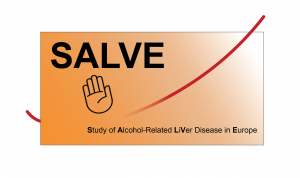 The EASL Consortium for the Study of alcohol-related liver disease (SALVE) is aimed at the creation of a multidisciplinary European-based organisation including individual research groups or established centres willing to do research in the area of ALD.
The EASL Consortium for the Study of alcohol-related liver disease (SALVE) is aimed at the creation of a multidisciplinary European-based organisation including individual research groups or established centres willing to do research in the area of ALD.
The planned research includes clinical studies, mostly epidemiological, such as the creation of a prospective multicentre registry of patients with ALD, aggregation of histological data, in order to define histological criteria and scores, and also basic research. The Consortium aims to achieve common goals and foster the acquisition of financial resources to support the activity of the Consortium.

The aim of the EASL-VALDIG consortium is to perform large multicentre epidemiological, pathophysiological and particularly interventional studies within the field of interest and to stimulate research for vascular liver disorders.
VALDIG (Vascular Liver Disease Group) is an independent network of researchers with a common interest in Vascular Liver Diseases.
The aim of this network is to foster research in this field. All VALDIG centres are connected by one database, which allows for the coordination of joint research projects. In addition, VALDIG is supporting the establishment of new research groups to provide young researchers with the opportunity for interaction and knowledge building.

